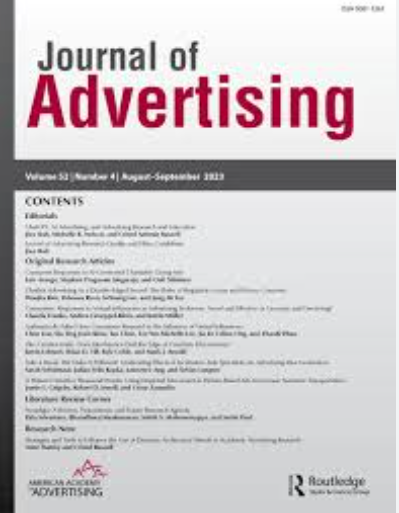Consumers’ Responses to Virtual Influencers as Advertising Endorsers: Novel and Effective or Uncanny and Deceiving?
IF 7
2区 管理学
Q1 BUSINESS
引用次数: 19
Abstract
Abstract Virtual influencers, generated on the computer, are changing the advertising industry. More and more brands utilize virtual instead of human influencers as endorsers for their marketing campaigns for a variety of reasons, e.g., better control of the influencer’s behavior, cost savings, or zeitgeist motives (desire to be “up to date”). However, there is currently little research on whether significant advertising goals are achieved using virtual influencers. We analyze, in an initial study, whether consumers find such influencers appealing compared to human influencers and whether they are able to identify that the influencer is not real. Our results show that consumers find it difficult to identify virtual influencers as such and that they still have more positive attitudes toward human endorsers in advertising campaigns. However, virtual endorsers can lead to higher perceived ad novelty. In a second study, we further examine whether the advertised product category functions as a moderator. Results show that perceived congruence between virtual influencers and product is dependent on the product category and leads to higher advertising effectiveness. Our studies lead to the implication that marketers should carefully consider the use of virtual influencers in accordance with the aspired advertising goals and brand values.消费者对作为广告代言人的虚拟影响力者的反应:新颖有效还是新奇欺骗?
摘要计算机上产生的虚拟影响者正在改变广告业。出于各种原因,越来越多的品牌利用虚拟而非人类的影响者作为营销活动的代言人,例如更好地控制影响者的行为、节省成本或时代精神动机(希望“与时俱进”)。然而,目前很少有研究表明,使用虚拟影响者是否能实现重大的广告目标。在一项初步研究中,我们分析了与人类影响者相比,消费者是否觉得这种影响者有吸引力,以及他们是否能够识别出影响者不是真实的。我们的研究结果表明,消费者发现很难识别虚拟影响者,而且他们在广告活动中仍然对人类代言人持更积极的态度。然而,虚拟代言人可以带来更高的广告新颖性。在第二项研究中,我们进一步考察了广告中的产品类别是否起到了调节作用。结果表明,虚拟影响者和产品之间的感知一致性取决于产品类别,并导致更高的广告效果。我们的研究表明,营销人员应该根据渴望的广告目标和品牌价值,仔细考虑虚拟影响者的使用。
本文章由计算机程序翻译,如有差异,请以英文原文为准。
求助全文
约1分钟内获得全文
求助全文
来源期刊

Journal of Advertising
Multiple-
CiteScore
11.20
自引率
10.50%
发文量
55
期刊介绍:
The Journal of Advertising is the premier journal devoted to the development of advertising theory and its relationship to practice. The major purpose of the Journal is to provide a public forum where ideas about advertising can be expressed. Research dealing with the economic, political, social, and environmental aspects of advertising, and methodological advances in advertising research represent some of the key foci of the Journal. Other topics of interest recently covered by the Journal include the assessment of advertising effectiveness, advertising ethics, and global issues surrounding advertising.
 求助内容:
求助内容: 应助结果提醒方式:
应助结果提醒方式:


